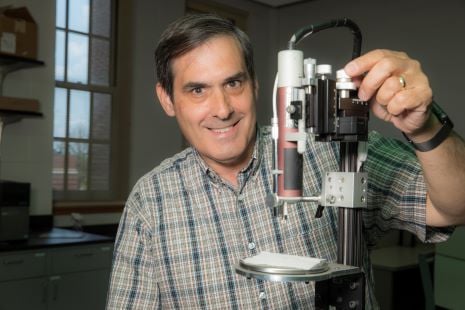 Steven Keller
Steven Keller

Steven Keller, Ph.D.
Professional Member
Oxford, OH
With an ominous “silver tsunami” cresting the horizon, what could be more important than recruiting and preparing the next generation of pulp, paper, tissue, corrugated and allied industry leaders?
For Miami University Professor, and recently inducted TAPPI Fellow, Steven Keller, Ph.D., that goal has been the focal point of a career dedicated to introducing, educating and inspiring a legion of new professionals. As a professor in the Chemical, Paper and Biomedical Engineering Department, Steve is responsible for many of the pulp and paper courses offered to students pursuing a minor in paper engineering. He also conducts extensive research on the material properties and structure of paperboards, tissue and towels, and nonwovens.
“The complex engineering processes that are required to help improve product properties, reduce costs and improve sustainability are infinitely intriguing and interesting,” said Dr. Keller. “Researching and solving them offers fascinating challenges – enough to keep countless professionals engaged and rewarded throughout their entire careers.”
He ought to know. Dr. Keller’s research group has been recognized for contributions in formation, thickness and density mapping, and mathematical analysis to quantify structure. In addition, they have developed new instruments to map topography, thickness and z-deformation to measure compressive response of tissues and towels. Most recently, his group developed analytical methods for 3D x-ray microscopy of low-density webs.
And that’s just one of the reasons why Dr. Keller supports the TAPPI Student Chapter at Miami University, currently serving as its advisor, and why he has been involved in TAPPI’s annual Student Summit, serving as Chairman this year. While having to transition into a virtual format due to the ongoing pandemic, Dr. Keller notes this year’s Summit, which took place February 6-7, attracted a record-breaking 309 student registrants, 115 resumes posted for review, and 145 students seeking internship interviews, co-ops and full-time employment opportunities. Following two days of information-packed sessions focused on helping students launch their careers, and a series of virtual mill tours conducted by Albany International and Graphic Packaging International, the event was roundly applauded as a success by all participants.
“I am hopeful this year’s outstanding numbers are an indication of what is in store for our industry and those who support it,” Dr. Keller noted. “There are so many exciting opportunities across a broad range of specialties – from paper and pulp to tissue and corrugated – and all sustainably driven. This is a field that can offer so much, to so many, and it is encouraging to see the next generation of leaders take an active part in it.”
Q: What prompted you to join TAPPI?
A: I began my career as a pulp and paper researcher at the Empire State Research Institute at the State University of New York -Environmental Science and Forestry (SUNY-ESF) in 1990. Being a member of this professional organization at the heart of this field was an obvious choice as it opened the door to essential resources, including publications, access to conferences, and becoming a member of the pulp and paper community (before joining TAPPI, Dr. Keller received his B.S. in Chemistry from Syracuse University, and his Ph.D. from SUNY-ESF).
Q: Have you been published in journals and/or other publications?
A: My research focus in on paper non-uniformity in surface chemistry and material distribution within fibrous webs, and how these are influenced by manufacturing processes and their impact on end-use performance. Among these and other topics in surface energetics and rheology, I have published 26 refereed journal articles, six chapters in the Proceedings of Fundamental Research Symposia (Oxford/Cambridge series), four book chapters, and 38 articles in conference proceedings. I have given 63 conference presentations, 40 invited guest lectures and also organized and presented 11 short courses/seminars for various companies.
Q: Can you describe your involvement with TAPPI over the years?
A: I have been an active contributor to TAPPI technical content since 1992, but more fully engaged since 1997. Contributions include conference participation and journal articles. I have led TAPPI short courses, and gave two TAPPI Process Control webinars in 2017. I have served as Chair of the TAPPI Paper Physics Committee, and regularly serve on the Technical organizing committee or session chair in TAPPI technical meetings. I continue to review papers for TAPPI Journal (TJ), Bioresources, Cellulose, Wood Science and Technology and Holtzforschung. As stated previously, I am also the advisor for TAPPI’s Miami University Student Chapter.
Q: How has TAPPI membership benefitted you and your career?
A: TAPPI membership provides continual benefits through the technical material it archives and makes readily available to members. Conferences, and TJ, provide the latest in innovations and developments in the industry and keeps my research and instructional material current. The personal interactions with other members at meetings and other service activities brings the community together and expands my perspective of the industry and its foundational technologies.
Q: What has been your experience using TAPPI resources?
A: TAPPI’s publications, including TJ, its magazines, books, and Useful Methods (UMs) and Technical Information Papers (TIPs), have been a primary resource for learning, using, and teaching the fundamentals of this very broad field of technology. By revealing its rich history of technology as developed through the years, and providing the latest advancements in science, engineering and business trends, one is well equipped to select and maintain a research agenda while teaching the next generation of engineers for the industry.
Q: What is a fun fact about you and/or any personal hobbies and activities?
A: I enjoy spending time traveling with my wife, especially visiting my two grandchildren who are at that curious and mischievous age of exploration. When cooped up in the winter (and also during COVID), I have had a chance to continue lifelong hobbies of scale wooden ship modeling and genealogy. Both have enlightened my appreciation for the contrast between personal challenges experienced now and in previous decades and centuries. The paper industry has given me the opportunity to visit 15 countries. And thanks to a papermaking friend and colleague, I’ve been able to experience skiing in the Alps after a thirty-five-year hiatus from the sport.
Q: What is your favorite paper product, and thoughts on most significant industry breakthroughs?
A: I have thoroughly enjoyed my research experiences with low-density tissue and towel papers. Drawn by the opposing requirements of web strength and high bulk for absorbency and softness, these materials have relied on complex engineering of process and structure to achieve products that meet consumer demands. Problems are ever present, and the need to improve properties, reduce costs, and promote sustainability remain primary objectives. Sorting these systems offers fascinating challenges.
Q: Closing thoughts on TAPPI membership?
A: TAPPI is the central forum into which the good people of the pulp and paper industry from around the world can convene, exchange perspectives, learn from one another, socialize, and develop lifelong friendships and professional relationships. Through its Standards and publications, TAPPI provides a solid foundation for the technology upon which researchers and commercial exchange can find agreement. While the generation of new concepts and approaches may find contention at the start, the mutual respect found in the personal exchanges of committee meetings, technical conferences, and publication reviews allows new ideas to grow and flourish. Personally, the industry and TAPPI have provided wonderful lifelong experiences, seeing the world, sampling cultures, seeing some of the most impressive engineering structures and processes, all the while making new friends through collegial interactions. One does not have to dig deep to find the gems that TAPPI and the industry have to offer.
